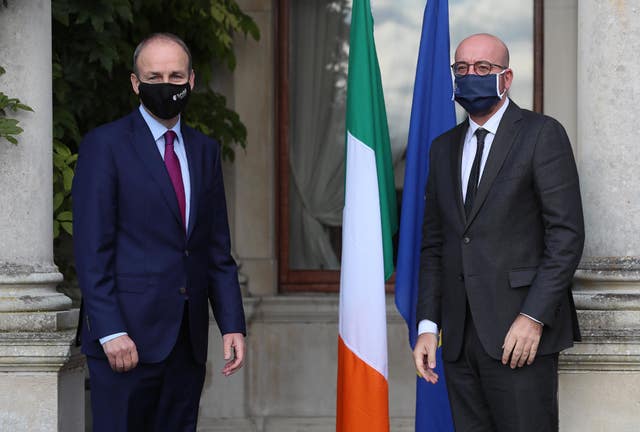Negotiations on a Brexit trade deal have reached the moment of truth, the president of the European Council has said.
Charles Michel was in Dublin on Thursday for talks with Irish premier Micheal Martin.
Their discussions at Farmleigh House came with a week to go until a crunch European Council summit.
The sides are still at odds on issues such as state aid and fisheries.
UK Prime Minister Boris Johnson has set the summit date as an effective deadline for determining whether a deal on a future relationship can be reached by the end of 2020.
Mr Michel said the EU wanted a deal, but not at any cost.
Cards on table
He said it was time for Mr Johnson to put his cards on the table.
Mr Michel said “significant steps” needed to be taken by the UK in the coming days if agreement was to be reached.
“The coming days are crucial, this is the moment of truth,” he said.
“There is only one week to go before the European Council on October 15 and 16.”
He added: “I have been very clear with Prime Minister Johnson.
“It’s now for the UK to restore trust and to put all its cards on the table.
“The EU is doing its utmost to find an agreement with the UK, but not at any cost.”

Mr Michel said the EU stood in solidarity with Ireland in terms of the Brexit negotiations.
“This is especially true when it comes to the full implementation of the Withdrawal Agreement and the protocol on Ireland and Northern Ireland,” he added.
“This text has been negotiated for three years, each word, each comma has been debated for hours and hours.
“It has been modified by both parties.
“There is simply no question of its full implementation.”
Mr Martin described the Brexit negotiations as “very challenging”.
But he said it appeared the mood around the talks had changed.
“There’s been more intensified engagement,” he said.
“Mood is one thing but it does need substance to follow the mood…positions need to change.”
Mr Martin said: “There needs to be movement in terms of getting into end-stage negotiations and we feel there’s a lot of work to be done yet on a number of fronts, and it’s quite a challenging task ahead of the negotiators to ensure that an agreement is arrived at.”
Settlement scheme
More than four million applications have been made to the EU settlement scheme so far, figures suggest.
EU citizens and their families are asked to apply to the Home Office scheme by June next year, in order to carrying on living and working in the UK when the Brexit transition period and freedom of movement ends.
According to provisional Home Office figures to the end of September, 4,061,900 applications have been received since the scheme opened in March last year.
More than two million of those (2,172,200) have been granted settled status, allowing them permanent leave to remain.
More than 1.6 million (1,614,600) have been granted pre-settled status, meaning they need to reapply after living in the country for five years to gain permanent residence.
But 16,600 applications have been refused, 34,600 were withdrawn or void and 42,400 were deemed invalid – where the Home Office decides someone is not eligible to apply or has failed to provide sufficient proof of residence.
It is not known how many people have repeatedly applied but it is thought less than 3% of applications are duplicates.
Last month immigration experts warned children in care and modern slavery victims who are EU citizens could “fall through the cracks” and lose their right to live in the UK after freedom of movement ends.
Members of the Roma community and other vulnerable people could also be at risk of becoming irregular migrants if they do not know they need to apply to the EU Settlement Scheme to secure their immigration status in the country after freedom of movement ends, a report from the Migration Observatory at the University of Oxford said.
Deadline
If a significant number of eligible people do not apply by the deadline they risk being classed as an irregular migrant – losing the right to live and work in the UK and potentially facing detention and deportation, the experts warned.
While most EU citizens living in the UK will find the scheme straightforward and easy to apply for, some people may struggle to complete the application, the report said.
Gaps in data published by the Home Office makes it hard to know how many current UK residents who are EU citizens have and have not applied, the experts said, reiterating concerns over the uncertainty about what could happen to people who fail to apply.
The Home Office previously indicated there could be some form of grace period for those with reasonable grounds for missing the deadline, and the department said it was working to “ensure that all eligible children and families are supported with their applications to the EU Settlement Scheme”.
Immigration minister Kevin Foster described European citizens as an “integral part of our society, culture and community” and called the scheme “hugely successful”, adding that there was a “range of support” available for applicants.
Related: Kexit – Top reactions as Lorries crossing the Channel will require Kent access permit

